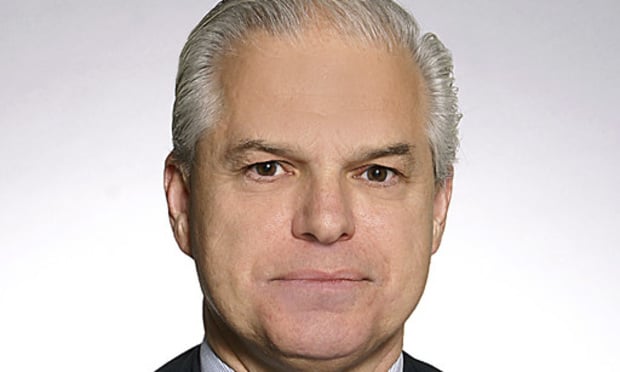Judge Wants to Pause NJ Transgender Discrimination Case Until SCOTUS Rules
The Third Circuit has yet to issue a ruling on whether Title VII protects transgender people, an issue before the Supreme Court this term.
October 01, 2019 at 07:03 PM
4 minute read
 U.S. District Judge Noel Hillman/courtesy photo
U.S. District Judge Noel Hillman/courtesy photo
A federal judge hearing a hostile work environment suit by a transgender woman wants to stay the litigation until the U.S. Supreme Court rules on whether transgender people are a protected class under Title VII.
U.S. District Judge Noel Hillman issued an order to show cause Monday as to why a ruling in the underlying Title VII lawsuit should not be stayed until the Supreme Court rules in this term's landmark transgender-rights case. Hillman issued the order in a suit by Charlize Cunningham, who claims she endured a hostile work environment related to her transgender status while working for Burlington Coat Factory Warehouse Corp.
Hillman's order proposes a stay of Cunningham's Title VII claim pending a Supreme Court ruling in R.G. and G.R. Harris Funeral Home v. EEOC, the case of a biologically male Michigan funeral director who was fired after informing colleagues she intended to transition to female and change her name from Anthony Stephens to Aimee Stephens. The justices are slated to hear arguments Oct. 8.
A federal judge in Detroit ruled in favor of the funeral home but the U.S. Court of Appeals for the Sixth Circuit reversed, holding that the funeral home discriminated against Stephens on the basis of gender, in violation of Title VII.
The U.S. Court of Appeals for the Third Circuit has yet to rule on whether transgender people are a protected class under Title VII, Hillman said. He gave both sides 14 days to submit briefs of up to five pages on whether a ruling in the case should be stayed pending the Supreme Court case.
Burlington Coat Factory's lawyer, in a motion to dismiss, asked the court to follow the lead of the Seventh, Eighth and Tenth circuits, which have held that transgender people are not a protected class under Title VII. Meanwhile, Cunningham's lawyer asked the court to follow the recent position of the Equal Employment Opportunity Commission, which is that discrimination based on transgender status is a violation of Title VII. Cunningham's lawyer also points to the holdings of the Sixth and Eleventh circuits, which have ruled that transgender people belong to a protected class under Title VII.
David Koller of Koller Law in Philadelphia, who represents Cunningham, said in an email, "We are really pleased that the court has allowed Charlize's claims to survive the initial attempt at dismissal by the defendant. I am really happy for Charlize. On a professional level, and as a human being, I feel strongly that transgendered individuals should be afforded these rights under the law."
Koller said he and his client had not had a chance to discuss whether they would rather proceed with the case now or wait for a Supreme Court ruling. But either way, Koller said, "we will definitely continue to be guided by a strong desire and motivation at justice for Charlize and all transgendered individuals."
Michael O'Mara of Stradley Ronon Stevens & Young in Philadelphia, who represents Burlington Coat Factory, did not respond to requests for comment about the ruling.
Cunningham was hired as a sales associate at a Burlington store in 2011. She soon became subject to disparaging comments and jokes about her transgender status. Cunningham was in a car accident that left her with a lymph nodes infection in 2013. Due to an undisclosed, underlying disability, the infection did not heal and Cunningham missed time from work.
When she advised the human resources department of her underlying disability and her need to attend ongoing medical appointments, she was told the company would reevaluate her employment if she had any more medical problems, the suit claims. Cunningham applied for accommodation under the Family and Medical Leave Act, which was initially approved but later revoked. She was then terminated in March 2014 for absenteeism and tardiness. Cunningham filed a complaint with the EEOC and received a right-to-sue letter in March 2018.
Hillman granted Burlington's motion to dismiss Cunningham's retaliation and failure-to-promote claims because she failed to raise those claims in administrative charges she filed with the EEOC. Hillman also granted Cunningham permission to file an amended complaint that provides more information about her disability. But he declined to grant Burlington's motion to dismiss the suit for failure to state a claim on which relief can be granted.
This content has been archived. It is available through our partners, LexisNexis® and Bloomberg Law.
To view this content, please continue to their sites.
Not a Lexis Subscriber?
Subscribe Now
Not a Bloomberg Law Subscriber?
Subscribe Now
NOT FOR REPRINT
© 2025 ALM Global, LLC, All Rights Reserved. Request academic re-use from www.copyright.com. All other uses, submit a request to [email protected]. For more information visit Asset & Logo Licensing.
You Might Like
View All

NJ Jury Awards $8M to Woman Injured by Employees Chasing Suspected Shoplifter
3 minute read

Amazon's Audible Hit With Privacy Class Action Over Use of Tracking Pixels
Trending Stories
- 1Uber Files RICO Suit Against Plaintiff-Side Firms Alleging Fraudulent Injury Claims
- 2The Law Firm Disrupted: Scrutinizing the Elephant More Than the Mouse
- 3Inherent Diminished Value Damages Unavailable to 3rd-Party Claimants, Court Says
- 4Pa. Defense Firm Sued by Client Over Ex-Eagles Player's $43.5M Med Mal Win
- 5Losses Mount at Morris Manning, but Departing Ex-Chair Stays Bullish About His Old Firm's Future
Who Got The Work
J. Brugh Lower of Gibbons has entered an appearance for industrial equipment supplier Devco Corporation in a pending trademark infringement lawsuit. The suit, accusing the defendant of selling knock-off Graco products, was filed Dec. 18 in New Jersey District Court by Rivkin Radler on behalf of Graco Inc. and Graco Minnesota. The case, assigned to U.S. District Judge Zahid N. Quraishi, is 3:24-cv-11294, Graco Inc. et al v. Devco Corporation.
Who Got The Work
Rebecca Maller-Stein and Kent A. Yalowitz of Arnold & Porter Kaye Scholer have entered their appearances for Hanaco Venture Capital and its executives, Lior Prosor and David Frankel, in a pending securities lawsuit. The action, filed on Dec. 24 in New York Southern District Court by Zell, Aron & Co. on behalf of Goldeneye Advisors, accuses the defendants of negligently and fraudulently managing the plaintiff's $1 million investment. The case, assigned to U.S. District Judge Vernon S. Broderick, is 1:24-cv-09918, Goldeneye Advisors, LLC v. Hanaco Venture Capital, Ltd. et al.
Who Got The Work
Attorneys from A&O Shearman has stepped in as defense counsel for Toronto-Dominion Bank and other defendants in a pending securities class action. The suit, filed Dec. 11 in New York Southern District Court by Bleichmar Fonti & Auld, accuses the defendants of concealing the bank's 'pervasive' deficiencies in regards to its compliance with the Bank Secrecy Act and the quality of its anti-money laundering controls. The case, assigned to U.S. District Judge Arun Subramanian, is 1:24-cv-09445, Gonzalez v. The Toronto-Dominion Bank et al.
Who Got The Work
Crown Castle International, a Pennsylvania company providing shared communications infrastructure, has turned to Luke D. Wolf of Gordon Rees Scully Mansukhani to fend off a pending breach-of-contract lawsuit. The court action, filed Nov. 25 in Michigan Eastern District Court by Hooper Hathaway PC on behalf of The Town Residences LLC, accuses Crown Castle of failing to transfer approximately $30,000 in utility payments from T-Mobile in breach of a roof-top lease and assignment agreement. The case, assigned to U.S. District Judge Susan K. Declercq, is 2:24-cv-13131, The Town Residences LLC v. T-Mobile US, Inc. et al.
Who Got The Work
Wilfred P. Coronato and Daniel M. Schwartz of McCarter & English have stepped in as defense counsel to Electrolux Home Products Inc. in a pending product liability lawsuit. The court action, filed Nov. 26 in New York Eastern District Court by Poulos Lopiccolo PC and Nagel Rice LLP on behalf of David Stern, alleges that the defendant's refrigerators’ drawers and shelving repeatedly break and fall apart within months after purchase. The case, assigned to U.S. District Judge Joan M. Azrack, is 2:24-cv-08204, Stern v. Electrolux Home Products, Inc.
Featured Firms
Law Offices of Gary Martin Hays & Associates, P.C.
(470) 294-1674
Law Offices of Mark E. Salomone
(857) 444-6468
Smith & Hassler
(713) 739-1250






